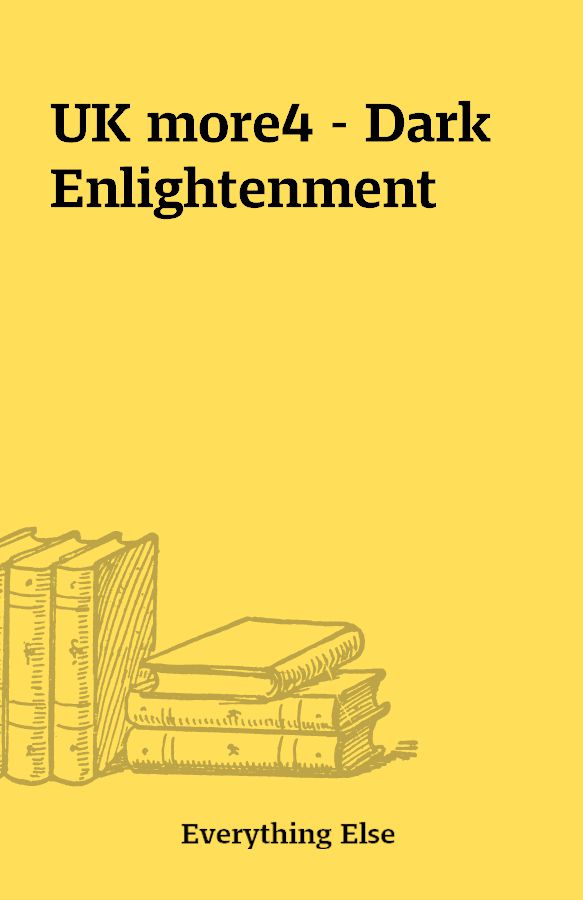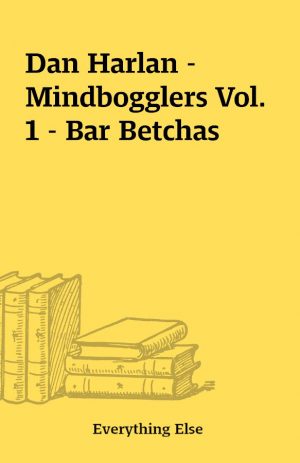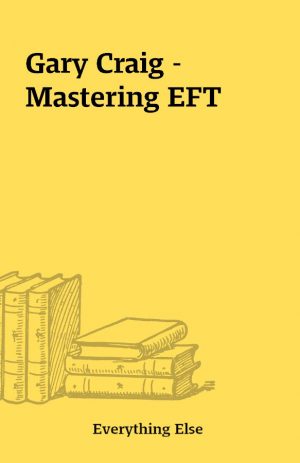UK more4 – Dark Enlightenment
Dark Enlightenment
[AVI – TV RIP]
Description
Channel 4’s new digital channel, More 4, has as part of its brief the screening of provocative documentaries. The recent programme Dark Enlightenment was certainly provocative, not to say one of the barmiest documentaries broadcast since the heyday of Erich von Däniken. Dark Enlightenment was scheduled as a companion piece to Richard Dawkins’ two-part anti-religious polemic, The Root of All Evil?, which this viewer found to be one-sided, idealist and tendentious. These defects were matched and easily surpassed by Dark Enlightenment, which at various points almost had me falling off my chair in astonishment. Presented by distinguished historian Michael Burleigh, the programme argued that actually most of society’s ills were the result of the decline of religion. To say the argument was unconvincing would be a vast understatement. Burleigh began by visiting one of the Blair government’s new citizenship ceremonies for naturalised immigrants and pointing out its banality, and seeming unwillingness to put forward a positive identity for new citizens. He also showed us a montage of an unidentified British city centre on a Friday or Saturday night, replete with brawling, puking and mooning youth. So far, so Daily Mail. A plausible argument could be put that the decline of religion has led to a moral vacuum, but a sociologist – or a Mail pundit – could put that case just as well, begging the question of why we required a Distinguished Historian putting a historical perspective on things, as Burleigh constantly reminded us. And indeed, it turned out that Burleigh had bigger fish to fry. Most of our social ills, it turned out, could be traced back to the eighteenth-century intellectual movement known as the Enlightenment, who sought to replace superstition with reason. While Burleigh acknowledged that some progress, notably in the scientific field, could be attributed to Enlightenment thinkers, their overall effect was nefarious. With their talk of reason and liberty, they had befuddled the minds of the hitherto contented masses, with disastrous consequences first seen in the French Revolution of 1789. Burleigh argued that the storming of the Bastille was the beginning of the end of civilisation, marking the overthrow by the radical Jacobins of what he delicately termed the “constitutional monarchy”, a strange way of referring to a staggeringly corrupt feudal absolutism. Burleigh then abused the revolutionary leaders Robespierre and Marat – referring to Marat as a “hack journalist”, rather unkind since his prose was a bit more elegant than Burleigh’s – and then argued, oddly, that all their talk of liberty and equality wasn’t really relevant as the removal of God from the centre of public life gave the green light to what Edmund Burke termed the “swinish multitude” to indulge their base instincts. However, Burleigh did not simply mount a defence of the ancien régime. While he did deplore the guillotine, the aristocracy was of less significance to him than the suppression of the revolt of royalist peasants in the Gironde region. While most accounts of the Revolution take into account the Girondin programme – effectively the restoration of absolutism – Burleigh painted us a picture of God-fearing common folks who had risen up against the secularists in Paris who were doing down their old-time religion. This – what might be termed the George W Bush view of history – was complemented by the description of Jacobin atrocities in the Gironde as “genocide”, and the assertion that, although there had been a few religious massacres in the past, this was of a wholly different order. Presumably our Distinguished Historian is unaware of the Crusades, Inquisition, witch-burnings or anti-Jewish pogroms, or else the crimes of the Church are considered to be qualitatively lesser. From retrospectively fighting the French Revolution, Burleigh then seeks to rehabilitate Pope Pius IX, who famously proclaimed himself infallible in protest at the growth of rational thought. While Burleigh admits this may have been a PR own goal, he attempts to retrospectively proclaim Pius a prophet of totalitarianism, a kind of Catholic Orwell, who warned against the increasing power of the State. What Burleigh fudges is the fact that Pius’s fulminations were directed at the secular State – specifically the Italian state which was encroaching on the Papal States at the time. Pius had zero problem with absolutist religious states, in fact he ruled over one. Burleigh then scoots forward to the inter-war period in Europe, where he takes in a rather cursory look at Italian fascism. It would be difficult to prove that the Vatican opposed Mussolini or that the fascist regime was anti-religious, so Burleigh confines himself to musing on the soulless nature of fascist monumental architecture and concluding that this shows the fundamentally irreligious nature of the Mussolini regime. Nor does he mention that the opposition to Mussolini was dominated almost exclusively by socialists and communists. Further sleight of hand came in Burleigh’s consideration of the 1917 Russian Revolution. We see Burleigh skip from the Bolsheviks’ confiscation of church wealth – which Burleigh assures us they greatly exaggerated – to the Stalinist anti-religious campaigns of the 1930s, to the death of Lenin in 1924 and the personality cult which subsequently grew up around him. Not only can Burleigh not walk a straight line, he interprets the Revolution almost entirely in terms of Karl Marx’s theory of religion – which he garbles – so it becomes an atheist coup against a God-fearing population. Again, the Orthodox Church’s close ties to the Tsarist autocracy, its exploitation of the peasantry, and the persecution of religious minorities, particularly Jews, do not feature. Then we come to Nazi Germany. What is most interesting here is not Burleigh’s ham-fisted attempt to prove the Nazi leadership were all militant atheists – they weren’t – but his claim that the Vatican was the greatest opponent of Hitler. We are told that many Christians resisted Hitler, although we aren’t told that more of them were Lutherans than Catholics, or that the active resistance in Germany was mainly composed of Social Democrats and Communists. Burleigh makes much of the 1937 Vatican encyclical “Mit brennender Sorge”, which criticised the Nazi regime, although its criticism did not extend to Hitler’s suppression of democracy, smashing of the labour movement or persecution of the Jews. Its main criticism was that the Führer cult was tending to take the rightful place of God – which, after all, was Hitler’s greatest sin on Planet Burleigh. We are left with the impression that Catholicism was the greatest enemy of fascism. Burleigh assures us that the popular belief that Pius XII was soft on fascism is a lie concocted by the KGB in a fit of spite after the Italian Communist Party lost the 1948 elections – which were heavily rigged by the CIA and the Vatican, although he doesn’t tell us this. Nor does he tell us about the Catholic Church role in Franco’s Spain, or the Vatican’s fulsome support for Ante Pavelic’s Nazi puppet state in Croatia, where Franciscan monks were directly involved in massacres of Jews and Orthodox Serbs, with a savagery that even brought protests from Italian fascist troops. Burleigh knows the Vatican opposed fascism because he’s read documents in the Vatican archives, although most of the documents from that period are still sealed. Finally we come to 1989, and the late Pope Wojtyla’s single-handed overthrow of the Berlin Wall. “Communism” was apparently brought down by “Catholic trade unionists” in Poland, and while Lech Walesa and Tadeusz Mazowiecki, pictured at this point, were undoubtedly devout Catholics, Solidarity was fundamentally a workers’ movement, not a religious movement. In fact the Polish Catholic hierarchy had long since struck up a modus vivendi with the Stalinist regime, were tolerated as a loyal opposition, and played a conservative and destructive role within Solidarity. Coming back to the present, our Distinguished Historian tells us what this all means. British liberals, he says, always believed the Soviet Union was basically a decent society with a few reformable flaws. Who are these liberals? Burleigh surely doesn’t mean the Cold Warriors of the Labour Party, or intellectuals like Orwell, who had no compunction about informing on suspected communists. More anonymous villains are added when Burleigh gripes about politically correct councils having “Winter Lights” instead of Christmas displays. Burleigh does have one good point, that children are not taught enough history. Indeed, such is the narrowness of the National Curriculum that History may as well be renamed Hitler Studies. But it really is not convincing to say that Tony Blair’s government is pursuing an aggressively secular agenda. Tony Blair, remember, thought it was a dandy idea to put a member of Opus Dei in charge of the nation’s schools; he has said in Parliament that he has no trouble with creationism being taught in his privatised “City Academies”; he is handing over dozens of state schools per year to the Church of England, and encouraging other religious groups to set up faith schools. If Britain is one of the most secular countries in the world, it is not by government diktat but by popular demand. But there is an underlying point that our Distinguished Historian hints at but does not make explicit, when he talks about the need to be aware of Europe’s Christian heritage. The one act of religious violence shown in this hour-long documentary is a brief snippet of the World Trade Center attack in September 2001. Now, even Burleigh would not say Osama bin Laden is a follower of Voltaire and Kant, or that Islamic obscurantism is part of the Enlightenment, so the image is just left hanging there as a non sequitur. It is implicit that white Europe needs to recover its Christian identity so as to fight the external threat of the Muslim hordes. And the government best placed to do that? Given the sneering references to liberty and reason, one can only assume a Catholic autocracy is what is called for. This documentary was worthless as a history lesson and pulled its punches as a polemic – a straightforward argument for a government along the lines of Franco’s Spain would have been more provocative, not to say honest. But it would have succeeded in stroking the prejudices of a certain section of the audience. And for those of us who don’t share those prejudices? My face during this programme was like the face of the theatre audience in Mel Brooks’ The Producers during the “Springtime for Hitler” musical number. I can say with confidence that the historical profession has found its answer to Peter Hitchens and Melanie Phillips.
You must be logged in to post a review.






Reviews
There are no reviews yet.